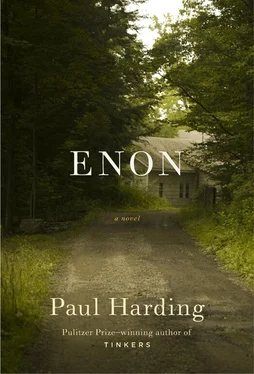IF THE DAUGHTER OF the son of a daughter of a son of a mad tinker who was the son of a mad minister perish beneath the wheels of a passenger car conducted by a distracted mother of three, her father shall be liable to death by slow poison from his own hand, during the long administration of which he shall wander bare and wooded hills, open and choked meadows, thickets and swamps, day and night, befreckled with ticks and beknotted with burrs, burned by the sun and frostbitten by the snow, making acquaintance with all the dead of Enon, be they recent or remote, and luring himself toward their society with flimsy, elaborately constructed decoys of his daughter.
I returned to the walk-in health clinic and told Dr. Winters I was afraid maybe I’d developed a little dependency on the pills. She took mercy and humored my euphemism and wrote me a prescription and gave me a list of vitamins to take and food to eat and phone numbers to call. I did everything she told me and sweated and ached and wept and shit myself and bid my farewells to all the exhausted effigies, the poor hapless understudies, with turnips for brains and empty birds’ nests for hearts. Once, during withdrawal from the drugs, which was hardly terrible in terms of real withdrawal but grisly and horrific nevertheless, I had a vision of all the versions of Kate I’d invented since her death lined up along a shelf on a wall, like old dolls in a dark, dust-choked room in the back reaches of the oldest basement in the village. They were made of rags and hay and grain sewn into little sacks, disemboweled by mice and rats. They had mismatched eyes of marbles or buttons. Their heads were scavenged gourds or cracked porcelain skulls that whistled in the drafty night.
Poor manikins; poor mandrakes; poor, innocent potatoes. What grass-stuffed rag dolls of my daughter I made. They were grotesques. Any flicker of beauty to be found in them had to be discovered only during the most merciful moments, by the kindest eyes, in order to perceive the source of human grief from which they had been conjured. They were fetishes, cobbled together by a mind clumsy with drugs and sorrow, and shaken in terror like rattles at the immense and exact unfolding of my daughter’s true absence elaborating itself in the world.
THE NIGHT BEFORE KATE died, I woke up from a dream about an immense house, filled with relatives from a dozen generations. It was the beginning of September and there was a heat wave and we didn’t have any air conditioners. Susan’s and my bedroom was located at the front of the house. There were two windows in the room, one facing the side yard, which looked out into the foliage of a large beech tree, and one facing the front lawn. I had opened both windows, hoping for a cross breeze, although the air was completely still, and I had angled an oscillating fan between the stool and sash of the side window, so that it would draw in air that had been cooled by the tree and push it through the room, over our bed. I think I knew that the tree did not cool the air, but the idea was appealing. When I awoke, the fan had tipped back against the screen in the window and was making a sound like an animal trying to claw through the screen as it tried to rotate back and forth. I sat up and gulped at the glass of water on my bedstand. Susan did not stir. She flourished in the heat and slept deeply. My T-shirt and my hair were damp with sweat. My pillowcase was sticky from sweat on both sides. More like a sponge than a pillow, I remember thinking, groggy, grumpy. It struck me at that moment that the room in which I’d last been in the house in my dream was a vast conservatory, with high, vaulted ceilings made of glass and aluminum, built-in bookcases full of old leather-bound books, and lots of red leather chairs and couches, like in the lobby of a grand hotel, all of which seemed to have immense potted ferns looming up behind them, shading them with green canopies of fronds. I crawled forward to the end of our bed and propped the fan back up on the windowsill and stuck my face in front of it. The currents of air broke against my damp skin and made the hair on my neck and arms prickle. Torpid, I crawled off the bed and knelt at the back window and looked out into the night. The air was perfectly still. Not so much as a leaf on a tree rustled. The yard seemed timeless, and it struck me that the wind moving the trees and the grass and the clouds was what usually gave the sense that time was still moving, that the world was still moving, that the wind was a mechanism something like a clock. Or the trees and the clouds were the clock and the wind the power released from some immense solar springs uncoiling in space. I thought my grandfather might have liked the idea of a clock made of clouds and wind. The display on the alarm clock flashed, so the power must have gone out at some point while I’d slept. I had no sense of what time it was. I knew that I would not be able to fall back asleep again anytime soon, so I tiptoed down the dark hall, past Kate’s room. She mumbled something when I passed the open door. I have noticed that sleepers will stir when the air in a still house is disturbed by a moving body. I scooted to the stairs and braced myself on the railings running down both sides of the stairway and eased my weight onto each step slowly, so that I would not wake Kate. She could be a tense, light sleeper, easily startled and easily frightened. It took her a few minutes after being jolted awake by thunder or a tree branch breaking in the yard or the wind toppling a garbage barrel into the street to realize where she was and that she was not in any danger. Being startled was something she especially hated; it was one of the very few things I ever saw her become really angry about whenever it happened, even if by accident.
I reached the bottom of the stairs. I remembered that the Red Sox were on a West Coast trip, so that their games did not begin until ten o’clock at night, and if the games were slow or went into extra innings they lasted deep into the night. I loved the Red Sox series on the West Coast. I loved baseball during late summer nights. The clock on the cable television box read 3:30. I clicked the TV on to see if I could get a score from the game. The sound came on first and I heard the monotone hum of a sparse crowd and the voice of the Red Sox play-by-play announcer. The screen kindled, and instead of reruns of the sports highlights show, the game between the Red Sox and the Seattle Mariners that had begun five and a half hours prior was still being played. The score was tied at one run to one, and the game was in the fifteenth inning. This seemed like a small treasure, something to help me deep in a mildly strange, half-asleep night. I went to the kitchen and poured myself a glass of orange juice and returned to the living room and sat on the couch to watch the game.
At some point I became aware that Kate was up and looking at me from the darkness of the hallway beyond the dining room. I wasn’t sure what to do. I didn’t want to turn and call her name, for fear of frightening her, even though it might seem as if she were the one who was liable to frighten me. So I watched the game for ten more minutes, self-conscious when I clinked out a little march on my juice glass with my wedding band, or cursed, Shit, shit, shit , at a diving catch the Mariners’ right fielder made to end the inning, aware of Kate watching me and thinking that she was looking in on a person who thought he was all alone, unobserved, when she was in fact watching a performance. It was that idea, that I was in some sense defrauding her, that caused me to finally sit myself up straight at the end of the inning, stretch my arms over my head, say Ay yi yi, shake my head, reach for my cigarettes and lighter on the end table next to the couch, and rise, as if I were innocently getting up to go have a smoke on the back porch before the game resumed.
Читать дальше












